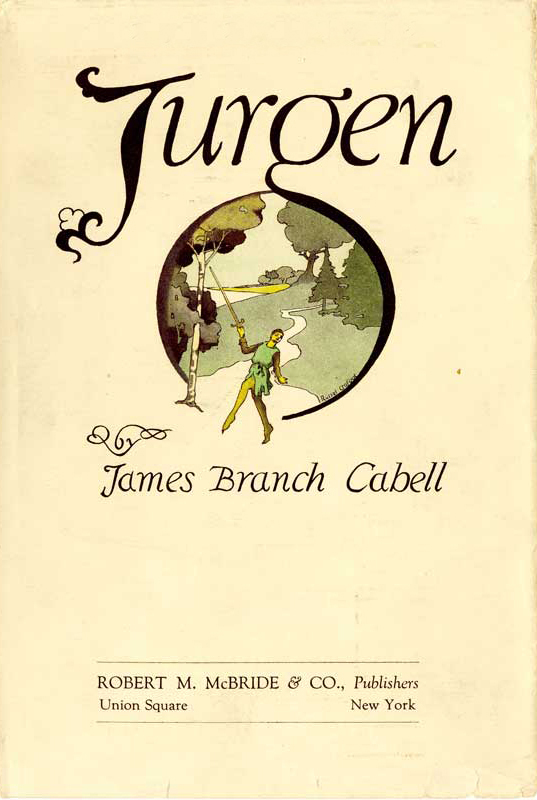 On January 14, 1920, the New York Society for the Suppression of Vice seized the printing plates and copies of James Branch Cabell’s book Jurgen: A Comedy of Justice from his publisher on charges of obscenity. The publisher, Robert M. McBride, and Cabell’s editor, Guy Holt, were charged with violating the Section 1141 of the Penal Code of the State of New York with the publication of Cabell’s novel, as it was a “certain offensive, lewd, lascivious and indecent book.” All materials relating to the production of the novel were removed from the premises.
On January 14, 1920, the New York Society for the Suppression of Vice seized the printing plates and copies of James Branch Cabell’s book Jurgen: A Comedy of Justice from his publisher on charges of obscenity. The publisher, Robert M. McBride, and Cabell’s editor, Guy Holt, were charged with violating the Section 1141 of the Penal Code of the State of New York with the publication of Cabell’s novel, as it was a “certain offensive, lewd, lascivious and indecent book.” All materials relating to the production of the novel were removed from the premises.
Writer Edward Hale Bierstadt, playwright and screenwriter Sidney Howard and writer and drama critic Barrett H. Clark formed an Emergency Committee to protest the action. A letter was sent out to collect signatures of support. Signatories could protest “in general” if they had not read Jurgen.
The body of the letter is as follows:
We, the undersigned, vitally concerned for the legitimate freedom of artistic expression in the United States, Protest
1. Against what we hold to be the arbitrary and unjustifiable charge preferred by the New York Society for the Suppression of Vice against the publisher of James Branch Cabell’s “Jurgen” (as an “offensive, indecent, lewd, obscene, and lascivious book), and the suppression of the same pending trials; and
2. Against the methods of that Society, an organization which we claim to be an unrepresentative body of people exercising disproportionate influence, and which by repeated actions in suppressing many works of genuine artistic merit, tends to discourage and inhibit the development of literature;
3. Against the law, which was framed by the founder of the Society, and which is eminently unfair in that it makes no distinction between art and pornography and is so worded as to afford the publisher or writer no fair opportunity for defense; and
4. Particularly against the practices of the New York Society for the Suppression of Vice as an extra-legal body, judging works of art and literature by no standards except such as it wishes to set up in the discovery and sequestration of individual passages deemed to be indecent and immoral. Not only does this Society arbitrarily seek out particular passages, it casts upon the whole work the stigma of more corruption which of necessity must cling to it—even in instances where the publisher is finally exonerated—for years to come. The judging of works of art by those who are manifestly unfit for the work, who deem it their duty to look only for the indecent, cannot but result in unfairness both to authors and publishers.
Believing that the existence of this law, loosely worded as it is, and of an organization like the New York Society for the Suppression of Vice which over-steps the legitimate field of its defensible activities in suppressing pornography, is a very real menace not only to literary art but to the reading public at large, we have hereunto affixed our signature in protest against both the law and the Society which makes it a business to see that the law is enforced.
Carl Van Vechten, Sinclair Lewis, Booth Tarkington, Willa Cather, Theodore Dreiser, John Barrymore, Eugene O’Neill, Channing Pollock, George Jean Nathan, Upton Sinclair, Mary Austin, Carl Van Doren, Boardman Robinson, Gelett Burgess and Julia C. Lathrop were among those who signed the protest.
Additional resources:
NEXT: Jurgen and the New York Society for the Suppression of Vice
The Judging of Jurgen by James Branch Cabell (1920)